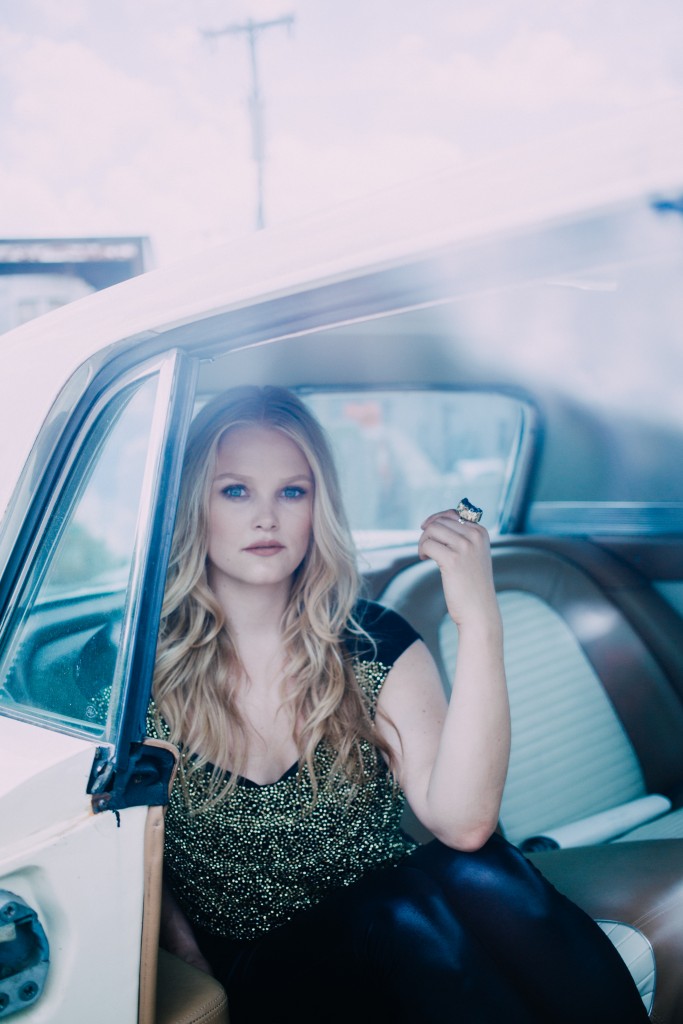
Up and coming artist Hailey Whitters is not looking for the safe route. Whether it’s lending empathy to a rarely-respected character or writing through the raw emotion of losing her younger brother in a car accident, Whitters leads her records honestly, tending not to shy from subjects that are rarely discussed in country. On “Get Around,” for instance, she lends compassion to a girl that’s found it easiest to be easy. Title track “Black Sheep” celebrates breaking from what’s safe. On “City Girl,” Whitters bemoans the downsides of a country lifestyle.
“I instantly knew I wanted that song,” Whitters says of “City Girl,” one of two on the album that she didn’t have a hand in writing. “Shannon and Adam wrote they song and I just loved how they rhymed girl with squirrel, I thought that was hilarious. Being from the country, I thought it was a fresh way of saying ‘I’m country’ without plastering it. When I was in the country, I wanted to get out, you know? I feel like that’s a real thing, but in country music right now they’re just bragging about how country they are. When I was in the country – and obviously a lot of them too, otherwise they wouldn’t be in Nashville – you wanna get out, you wanna find something bigger. When you’re growing up there you’re lured by bigger cities and you’re curious about them. It’s good to go home – I love being from the country, and I’m sure some day I’ll live in the country again – but when I was young and kind of restless I wanted to get out of it.”
Whitters grew up in rural Iowa, surrounded by the sounds of artists like Randy Travis and Trisha Yearwood. “I don’t know why, I just had this really weird draw towards country music and I knew nothing about it,” she says. “I got kind of obsessed with reading about the history of country music. I always had this idea that I wanted to be a country singer and move to Nashville.” She moved to Nashville at 17 to attend Belmont University, eventually signing with publisher and “left of center lighthouse” Carnival Music.
“You have to be really in tune with yourself,” Whitters says of songwriting. “A lot of people will say, ‘Can we say that?’ or ‘That doesn’t rhyme’ and I’m just like, make the rules. I feel like you always hear, ‘That’s not gonna work,’ and then it does and that’s the new rule.” Whitters has spent plenty of time studying the rules that structure music – she earned her Bachelor’s degree in music business – but it’s their calculated disregard that’s informed the creation of her debut album, Black Sheep. Even with the release itself Whitters is bucking convention, eschewing the expectation of releasing an EP to then court major labels for the full-length debut.
“Am I the only one who wants to cut loose? That hole in the fence, gonna jump right through,” Whitters sings on the title track. “Who really wants to be white as snow? The thing about black is the dirt don’t show.”
“I kind of had that title pop in my head one day,” Whitters says of “Black Sheep.” “Adam Wright and I started writing toward it and playing a little on the story of Little Bo Peep and all that nursery rhyme kind of stuff, and Adam threw out the line ‘who wants to be white as snow?’ and then I followed it up with ‘the thing about black is the dirt don’t show.’ We started making it this anthem about being different. Everyone was telling me, ‘You’re a little more left’ so I felt kind of like the black sheep.”
One of the standout aspects of Black Sheep is the admission of flaws – Whitters isn’t perfect, nor does she seek to be – it’s more fun being true to herself than true to what’s expected, and more interesting exploring life’s realities than presenting its shimmering veneers. “I’m really triggered by stuff like that,” she says. “I think humans can be really messy, and I think people relate to things like that. I like to listen to people telling stories about how they’re sorry or they messed up – that feels more real to me than just some glossed over perception of how everything’s great and perfect. That just never felt real.” There’s little that’s painted perfect on Black Sheep – “take it from a heartbreaker to one, I can break hearts too,” Whitters cautions on “Heartbreaker.” On “Low All Afternoon,” she hangs tough with a protagonist who cheated with a man who chose to return to being faithful. On “People Like You,” perhaps the most romantic song on the album, Whitters finds soulmatery written in stars just as mis-aligned as her own. “I don’t really write love songs,” Whitters confesses, with more of a predilection for romanticizing the less-than-romantic.
Whitters is currently taking a bit of a writing hiatus, focusing on bringing her album to live crowds. “I love being on the road,” she says. “I always say like left brain, right brain, you know? I’m very much in a different mindset when I’m going back out on the road and it’s hard for me to get into that creative place. It’s not like I’m writing on the road – I’m not riding in a tour bus with a bus driver, like I’m driving and we’re crammed into a tiny little Jeep. I’m still trying to figure out that balance.”
Grab Black Sheep on iTunes and take a listen below:
